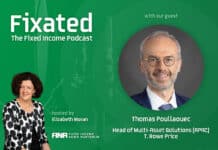The outlook for 2025 is broadly positive for fixed interest investors, with actively managed strategies well positioned to capitalise on opportunities and mitigate risks...
From Federated Hermes' Patrick Marshall, Head of Private Credit.
The APAC direct lending is continuing to expand. Australia has been at the forefront of this...
High returns from high yield
On the bond side the clear winners have been leveraged and high-yielding fixed income assets which sit right on the...
By Ken Orchard, Head of International Fixed Income at T. Rowe Price
Despite the U.S. Federal Reserve starting its monetary easing cycle in September, yields...
The escalating geopolitical tensions driven by great power rivalries and conflicts have made defense a critical focus for policymakers and investors, according to Kim...
From Dan Farmer - CIO of MLC Asset Management
Fixed income
Market pricing of the Fed appears overdone in our central case soft-landing view, and with...
I'm not sure how others remember the first Trump presidency.
For me, I felt like I needed to be prepared for anything. And like anyone...
In Brief:
Investors welcome deregulation under Trump 2.0
The US government played a dominant role in financial markets under the last three administrations
How...
From Mawer Credit Team
High yield spreads continue to tighten. As risk premiums fall, and economic and political conditions appear positive for corporates in general,...
Income Asset Management (IAM) proposes two model portfolio solutions for wholesale investors.
The two models provide investors with a conservative and transparent portfolio allocated to;
(i)...




































